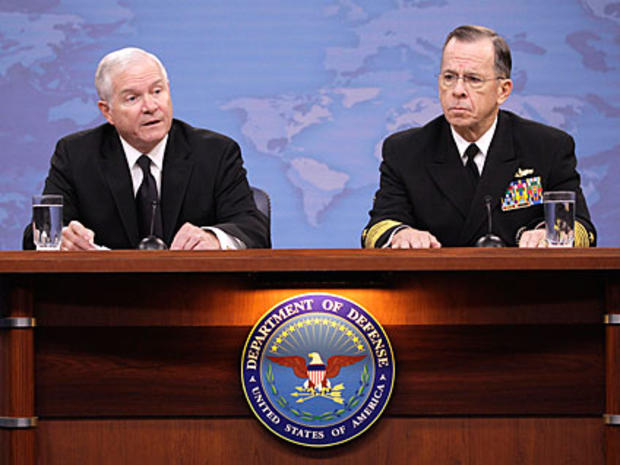What's Next in "Don't Ask, Don't Tell" Fight?
The military has released its much-anticipated report on the impact of repealing the "don't ask, don't tell" policy banning gays from serving openly, and it found what early leaks suggested: While some servicemembers object to repeal and short-term issues are possible, allowing gays to serve openly would not have long-lasting negative consequences.
Now the question turns to whether repeal will actually take place. Advocates have pinned their hopes on the lame duck session of Congress, since the next Congress in January will have a higher percentage of Republicans and thus diminished prospects for overturning the policy.
The House voted back in May to allow the Defense Department to repeal the 1993 policy. Under the House provision (which is attached to a broader defense bill), the policy could be repealed 60 days after the release of the Pentagon report if and when military leaders, including President Obama, certify that repeal would not be disruptive.
Mr. Obama has expressed support for repeal, and the report out Tuesday will not change his mind. (He put out a statement to that effect late Tuesday afternoon.) In addition, Defense Secretary Robert Gates and the chairman of the Joint Chiefs of Staff, Adm. Mike Mullen backed the report upon its release. That means the only real stumbling block to eventual repeal is the Senate, where 60 votes are needed to overcome a Republican filibuster.
In September, Senate Republicans (joined by two Democrats) blocked repeal. But there are signs that the votes may be there in the lame duck session, should Democrats prioritize overturning the policy. (At left see reaction to the Pentagon report from former U.S. Marine Tom Carpenter, who was forced to resign from active duty in the seventies for being gay.)
Republican Sen. Susan Collins of Maine said after the September vote that she only opposed repeal because Democrats did not allow for a full amendment process before the vote; Sen. Joe Lieberman, an independent who strongly supports repeal, said earlier this month that he is confident there are 60 votes for repeal if the full amendment process is allowed.
But therein lies the rub: There is only one month to go before the new Congress comes in, and there are a ton of items on the Senate agenda, chief among them ratification of the new START arms treaty with Russia, how to extend the Bush-era tax cuts, funding the government and extending unemployment insurance.
Following a meeting with Mr. Obama Tuesday, Senate Republican leader Mitch McConnell said the tax cuts and funding the government should be the top priorities and that other issues simply "aren't in the same category" as those two.
Bringing repeal to the floor under the full amendment process could take two weeks, though Lieberman says McConnell and Reid could negotiate to get that down to one week. Even that is a significant chunk of time, however, with so few days left before the session ends. Senate Majority Leader Harry Reid has promised to bring the matter to a vote before the year ends, and hearings on the study will be held this week.
Sen. John McCain, who has strongly opposed repeal despite once stating he would consider it if military leaders offered their backing, is unlikely to waver in his opposition; he has argued that the report is flawed because it addresses how to repeal the policy but not whether to do so.
Perhaps the most compelling argument to bring Republicans aboard came from Gates, who noted that the issue was being hashed out in courts. Should Congress not repeal the policy legislatively - which Gates said would allow the military to take its time to implement repeal responsibly - the military could be forced to do so overnight, which Gates cast as a high-risk proposition. He said those who vote against repeal "are rolling the dice that this policy will not be abruptly overturned by the courts."
(At left, see Gates discussing the report.)"Just a few weeks ago, one lower-court ruling forced the Department into an abrupt series of changes that were no doubt confusing and distracting to men and women in the ranks," Gates said. "It is only a matter of time before the federal courts are drawn once more into the fray, with the very real possibility that this change would be imposed immediately by judicial fiat -- by far the most disruptive and damaging scenario I can imagine, and the one most hazardous to military morale, readiness and battlefield performance."
That line of argument gives Republican senators some cover to grit their teeth and back repeal, even if they didn't before - and even if they aren't happy with the amendment process. Should the 60 votes materialize, it would be a major victory for gay rights advocates, though they may face a longer-than-expected wait for the policy to formally end as the military embarks on a potentially drawn-out process to implement the change.

